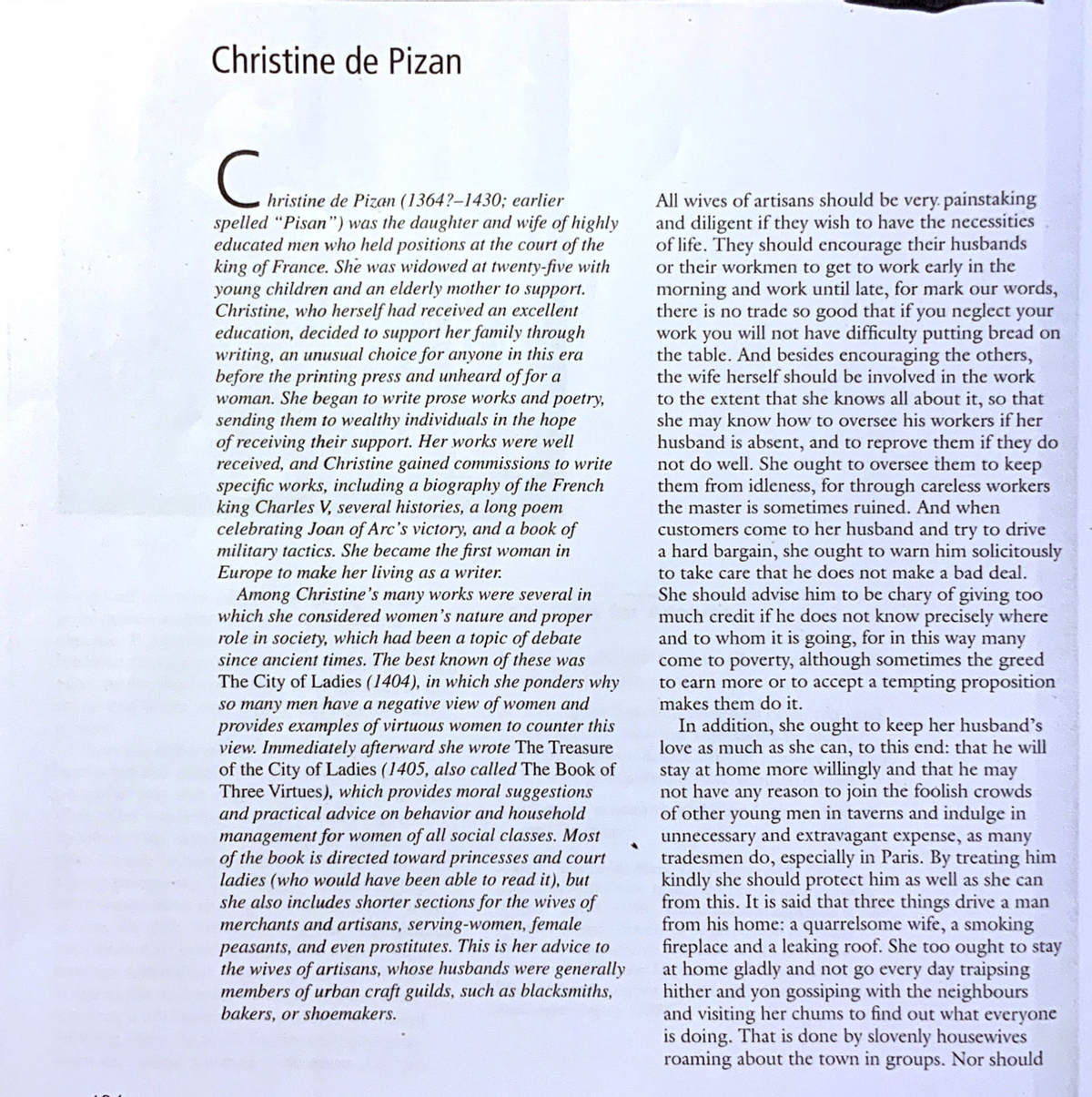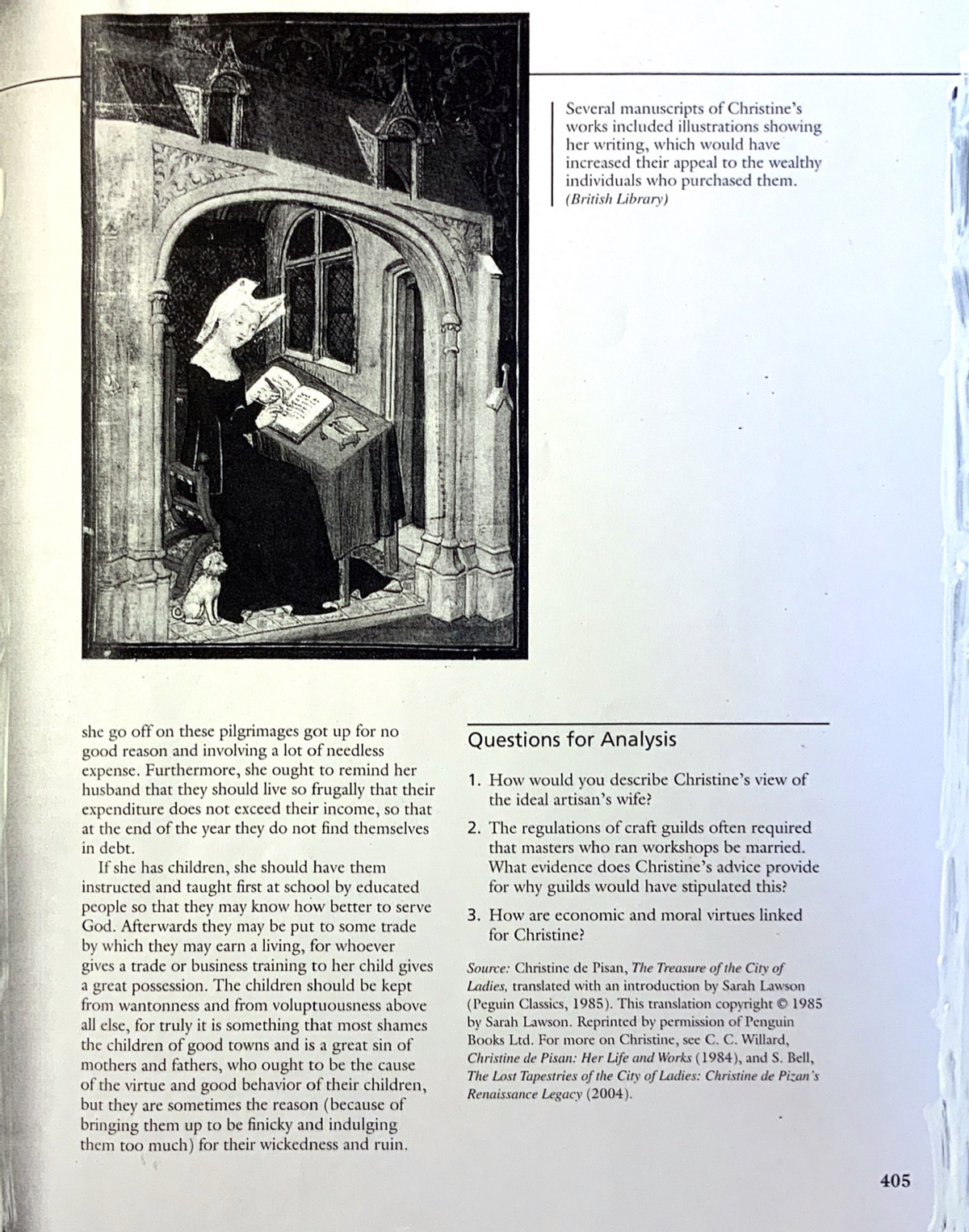In the article below "Christine de Pizan", The regulations of craft guilds often required that masters who ran workshops be married. What evidence does Christine's advice provide for why guilds would have stipulated this? Note: USE INFORMATION FROM THE ARTICLE NO WHERE ELSE
In the article below "Christine de Pizan", The regulations of craft guilds often required that masters who ran workshops be married. What evidence does Christine's advice provide for why guilds would have stipulated this? Note: USE INFORMATION FROM THE ARTICLE NO WHERE ELSE
Related questions
Question
In the article below "Christine de Pizan", The regulations of craft guilds often required that masters who ran workshops be married. What evidence does Christine's advice provide for why guilds would have stipulated this? Note: USE INFORMATION FROM THE ARTICLE NO WHERE ELSE.

Transcribed Image Text:Christine de Pizan
C₁
hristine de Pizan (1364?-1430; earlier
spelled "Pisan") was the daughter and wife of highly
educated men who held positions at the court of the
king of France. She was widowed at twenty-five with
young children and an elderly mother to support.
Christine, who herself had received an excellent
education, decided to support her family through
writing, an unusual choice for anyone in this era
before the printing press and unheard of for a
woman. She began to write prose works and poetry,
sending them to wealthy individuals in the hope
of receiving their support. Her works were well
received, and Christine gained commissions to write
specific works, including a biography of the French
king Charles V, several histories, a long poem
celebrating Joan of Arc's victory, and a book of
military tactics. She became the first woman in
Europe to make her living as a writer.
Among Christine's many works were several in
which she considered women's nature and proper
role in society, which had been a topic of debate
since ancient times. The best known of these was
The City of Ladies (1404), in which she ponders why
so many men have a negative view of women and
provides examples of virtuous women to counter this
view. Immediately afterward she wrote The Treasure
of the City of Ladies (1405, also called The Book of
Three Virtues), which provides moral suggestions
and practical advice on behavior and household
management for women of all social classes. Most
of the book is directed toward princesses and court
ladies (who would have been able to read it), but
she also includes shorter sections for the wives of
merchants and artisans, serving-women, female
peasants, and even prostitutes. This is her advice to
the wives of artisans, whose husbands were generally
members of urban craft guilds, such as blacksmiths,
bakers, or shoemakers.
All wives of artisans should be very painstaking
and diligent if they wish to have the necessities
of life. They should encourage their husbands
or their workmen to get to work early in the
morning and work until late, for mark our words,
there is no trade so good that if you neglect your
work you will not have difficulty putting bread on
the table. And besides encouraging the others,
the wife herself should be involved in the work
to the extent that she knows all about it, so that
she may know how to oversee his workers if her
husband is absent, and to reprove them if they do
not do well. She ought to oversee them to keep
them from idleness, for through careless workers
the master is sometimes ruined. And when
customers come to her husband and try to drive
a hard bargain, she ought to warn him solicitously
to take care that he does not make a bad deal.
She should advise him to be chary of giving too
much credit if he does not know precisely where
and to whom it is going, for in this way many
come to poverty, although sometimes the greed
to earn more or to accept a tempting proposition
makes them do it.
In addition, she ought to keep her husband's
love as much as she can, to this end: that he will
stay at home more willingly and that he may
not have any reason to join the foolish crowds
of other young men in taverns and indulge in
unnecessary and extravagant expense, as many
tradesmen do, especially in Paris. By treating him
kindly she should protect him as well as she can
from this. It is said that three things drive a man
from his home: a quarrelsome wife, a smoking
fireplace and a leaking roof. She too ought to stay
at home gladly and not go every day traipsing
hither and yon gossiping with the neighbours
and visiting her chums to find out what everyone
is doing. That is done by slovenly housewives
roaming about the town in groups. Nor should

Transcribed Image Text:she go off on these pilgrimages got up for no
good reason and involving a lot of needless
expense. Furthermore, she ought to remind her
husband that they should live so frugally that their
expenditure does not exceed their income, so that
at the end of the year they do not find themselves
in debt.
a
If she has children, she should have them
instructed and taught first at school by educated
people so that they may know how better to serve
God. Afterwards they may be put to some trade
by which they may earn a living, for whoever
gives a trade or business training to her child gives
possession. The children should be kept
from wantonness and from voluptuousness above
all else, for truly it is something that most shames
the children of good towns and is a great sin of
mothers and fathers, who ought to be the cause
of the virtue and good behavior of their children,
but they are sometimes the reason (because of
bringing them up to be finicky and indulging
them too much) for their wickedness and ruin.
Several manuscripts of Christine's
works included illustrations showing
her writing, which would have
increased their appeal to the wealthy
individuals who purchased them.
(British Library)
Questions for Analysis
1. How would you describe Christine's view of
the ideal artisan's wife?
2. The regulations of craft guilds often required
that masters who ran workshops be married.
What evidence does Christine's advice provide
for why guilds would have stipulated this?
3. How are economic and moral virtues linked
for Christine?
Source: Christine de Pisan, The Treasure of the City of
Ladies, translated with an introduction by Sarah Lawson
(Peguin Classics, 1985). This translation copyright © 1985
by Sarah Lawson. Reprinted by permission of Penguin
Books Ltd. For more on Christine, see C. C. Willard,
Christine de Pisan: Her Life and Works (1984), and S. Bell,
The Lost Tapestries of the City of Ladies: Christine de Pizan's
Renaissance Legacy (2004).
405
Expert Solution
This question has been solved!
Explore an expertly crafted, step-by-step solution for a thorough understanding of key concepts.
This is a popular solution!
Trending now
This is a popular solution!
Step by step
Solved in 3 steps
